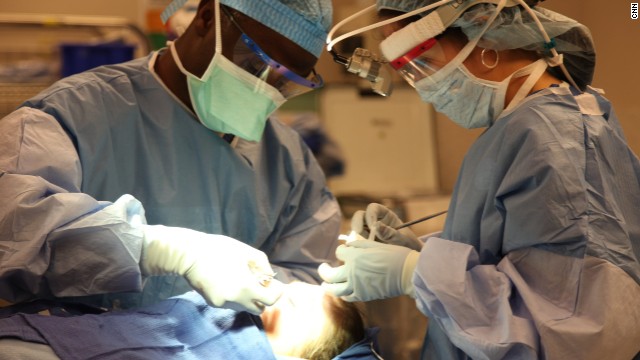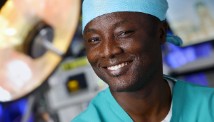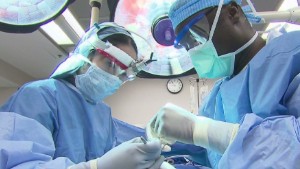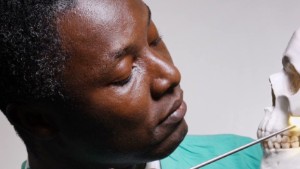How African doctors can cure medical 'brain drain'

The doctor who rebuilds faces
STORY HIGHLIGHTS
- Kofi Boahene is a surgeon at the Johns Hopkins Hospital who regularly volunteers across Africa
- A fifth of all African-born physicians work overseas, according to one study
- Boahene says many African doctors in the diaspora are giving back to the continent
- "African doctors may be living overseas, but their hearts are in Africa," he says
Editor's note: Born in Ghana, Kofi Boahene
is associate professor of otolaryngology, head and neck surgery, facial
plastics and reconstructive surgery at the Johns Hopkins Hospital,
Baltimore.
(CNN) -- On a recent medical volunteer trip I was
introduced to an elderly woman on the surgical wards. She had a growing
tumor that had deformed her face and was threatening her life. For three
months she was told a set of special equipment was needed to perform
her surgery. As she waited for this equipment, her tumor grew larger and
compromised her vision in one eye.
I reviewed her records
with her local surgeons and formulated a plan to remove her tumor. Using
instruments that were available, we successfully removed her tumor
after a two-hour operation. Looking back, her case was complex but not
unusual. I have volunteered as a surgeon in several African countries
and unfortunately, the story of this African woman is common. Her story
highlights the gap in medical and surgical expertise available in
Africa.

Dr. Kofi Boahene
Many highly skilled
doctors and health professionals of African birth practice cutting-edge
medicine and surgery in leading medical institutions outside Africa.
They are valuable to the hospitals and countries they work in but their
hearts are also at home in their native countries.
They are part of Africa's so-called "brain drain." A 2008 publication
showed that, as of the year 2000, one fifth of all African-born
physicians and one tenth of all African-born nurses were working
overseas.
Global health policy
experts and several world agencies have suggested a variety of measures
to reverse this trend, but I have often wondered whether one piece to
this puzzle is being overlooked. Perhaps African health professionals in
the diaspora are actually helping on the home front, but in less overt
and quantifiable ways.
African doctors and other
health professionals working abroad may be living overseas but their
hearts are in Africa. As the saying goes, home is where the heart is,
but what if the heart is in more than one place?
African doctors living
abroad have families back in Africa and are motivated to contribute to
the improvement of healthcare delivery on the continent. While some are
ready to return back to their native countries, others are not prepared
to make a complete move, but their skills can still make an impact in
developing healthcare expertise and delivery systems on the continent.
Beyond medical missions
African health
professionals in the diaspora are giving back by participating in
medical missions. They often recruit their colleagues to volunteer as
well. Medical missions can be seen as first step in helping in the
healthcare field.
These missions require
investment of personal time, finances and other resources. Fitting
mission trips into one's practice is always a challenge but the rewards
of making a significant difference in lives makes it worthwhile. In a
single mission, over 1,000 patients can be screened and treated and
hundreds may receive vital surgery that may otherwise be unavailable.
 Surgeon helps build talent around globe
Surgeon helps build talent around globe
 Making faces move after injury
Making faces move after injury
Medical missions can
have a longer-lasting significance if they are structured to emphasize
teaching and training in order to build local capacity. An effective
strategy is to identify a cadre of doctors and mid-level professionals
who are interested in developing their expertise in a focused area.
Pairing the local professionals with an expert over several mission
trips can result in a long-term mentoring relationship that is extremely
effective in passing on expertise. A multiplier effect is realized when
the mentee becomes a mentor to other junior professionals.
Medical missions are not
one-way streets. They require commitment from both the local staff and
the visiting medical team. They should be seen as equally weighted
mutually beneficial partnerships.
Generosity in teaching
African health
professionals in the diaspora are transferring expertise back to the
continent through educational seminars and training workshops.
African Partners Medical
is a group of African doctors and nurses in North America and Europe
who sponsor annual educational workshops around Africa. These seminars
attract faculty who are leaders in their fields. Through didactic
teaching, workshops and hands-on experiences, local physicians, nurses
and other supporting staff are offered the opportunity to acquire new
skills in a small group setting.
In 2009 a group of Johns
Hopkins neurosurgeons visited the teaching hospitals in Benin, Nigeria
and the Korle Bu hospital in Accra, Ghana. The emphasis was on hands-on
training. At the end of the week-long training the U.S. neurosurgeons
saw the potential in a young Ghanaian neurosurgeon who was just three
years out of his residency training.
This neurosurgeon was
interested in gaining specialized expertise in pediatric neurosurgery
but no such training opportunity exists in Ghana. Because of the
exposure gained during this teaching mission, this young surgeon was
able to come to Johns Hopkins for a year of formal fellowship.
Telemedicine and medical second opinion
The rapid growth of
information technology in Africa presents an opportunity for remote
consultations and medical second opinions.
Telemedicine has the
potential of effectively linking African health professional in the West
with their counterparts in Africa. The greatest challenge to this
potential has always been the high cost of telemedicine infrastructure
and other related technical and organizational challenges. These
challenges are rapidly fading.
Each week I spend
approximately two to three hours on online consultations using
technology that is readily available. Through remote-access capabilities
I review imaging studies, test results and communicate directly with
both patients and physicians around the globe, including several African
countries. Pathologists and radiologists are reading slides and images
remotely. Organizations of African doctors in the USA and Europe are
establishing formalized channels that will allow patients and colleagues
in Africa to tap into the expertise of their members. This already
happens in informal ways.
Research collaboration
Some of the leading clinician scientists in the fields of breast cancer, sickle cell anemia,
viral hepatitis and liver cancer -- diseases with high prevalence in
Africa -- are African health professionals working in research hospitals
and institutions in the West.
These scientists partner with international agencies in directing resources and collaborative research projects back to Africa.
Mobilizing
Recent years have seen a
steady return of African doctors back home. Most returning doctors set
up individual practices and establish their own mini-hospitals. These
scattered practices are less likely to result in institutions that last
beyond one generation or result in the degree of transformation
necessary to narrow the gap in healthcare expertise.
Having trained at the
Mayo Clinic in Rochester, Minnesota, I am keenly aware of how a small
group practice can evolve beyond one generation into a world-renowned
medical center. The Mayo Clinic developed gradually from the medical
practice of a father and his two sons. From the beginning, innovation
was their standard and as the demand for their services increased, they
asked other doctors and researchers to join them in what became the
world's first private integrated group practice.
Pooling the resources of
knowledge and skills among several doctors is what resulted in the
present day world-renowned clinic. As African health professionals
mobilize to return home or contribute from across the pond, greater
strides are bound to occur if they can emulate the example of the Mayo
brothers.
Resources, skill sets
and expertise should be pooled to establish viable private medical
institutions that can survive their founders and expand beyond one
generation.

Nenhum comentário:
Postar um comentário